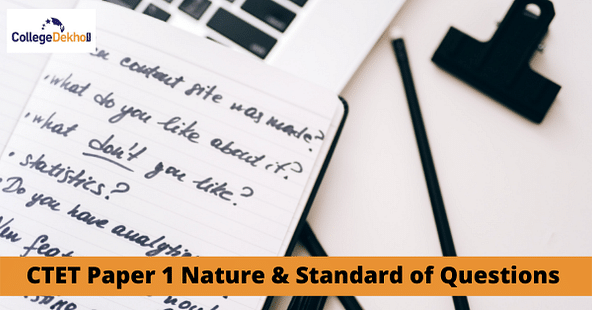CTET 2021 Paper 1 is conducted for candidates aspiring to teach primary classes. Check the details about nature & standard of questions that will be asked in Paper 1 of CTET.

CTET 2021 exam is scheduled to be conducted from December 16, 2021, to January 13, 2022. The exam is going to be conducted in online mode this year. The exam will be conducted in two papers: Paper I and Paper II. It is important for the candidates to understand the difference between Paper I and Paper II. Paper-I will be conducted for the candidates who are willing to teach students from classes 1 to 5 while Paper-II will be conducted for the candidates who are willing to teach students from classes 6 to 8. The nature and standard of the questions asked in Paper-I will be different than that of Paper-II. If the students have prepared or are preparing for the exam, it is essential that they are familiar with the pattern of questions asked in the CTET 2021 paper-I so that they can attempt the questions accordingly.
The following paper will overview the details related to the nature & standard of the questions for the CTET 2021 Paper-I exam.
Question & Mark Division for CTET 2021 Paper-I
The questions and mark distribution for CTET 2021 Paper-I is elaborated in the table below:
Subject | Marks | Questions |
|---|---|---|
Child Development and Pedagogy (compulsory) | 30 Marks | 30 |
Language I (compulsory) | 30 Marks | 30 |
Language II (compulsory) | 30 Marks | 30 |
Mathematics | 30 Marks | 30 |
Environmental Studies | 30 Marks | 30 |
Total | 150 Marks | 150 |
CTET 2021 Paper-I Nature & Standard of Questions
The nature and standard of questions for CTET 2021 Paper-I has been explained in the points below:
There will be multiple choice type questions in paper-I. That means there will be 4 options available for each question and the candidate has to choose one correct answer for each question.
There will be 5 sections in Paper-I of different subject areas which will be designed to test the ability of the candidates in these areas.
There will be a total of 150 questions for Paper-I. 30 questions will be asked for each section.
There will be a section in Paper-I named Child Development and Pedagogy which will focus on the educational psychology of teaching and learning relevant to the age group of 6-11 years. This section will test the ability of the candidates in terms of interaction with learners, diverse learners, ad the qualities & attributes of a good facilitator of learning.
The Language I section in Paper-I will test the ability of candidates in terms of language proficiency related to the medium of instructions.
The Language II section in Paper-I will test the ability of candidates in terms of elements of language, communication, and comprehension. Language II will be opted by the candidates depending on their preference and it must be different from Language I.
There will be different languages from which the candidates choose from for Language II.
The Mathematics section in Paper-I will test the ability of the students in terms of Mathematical concepts, problem-solving, numerical calculations, and application of theories.
The Environmental Studies section of Paper-I will test the ability of the students in terms of concepts, problem-solving abilities, and pedagogical understanding and applications of the subject.
For all the sections of Paper-I, the weightage of the topics will be equally distributed.
The questions in Paper-I will be completely from the NCERT syllabus prescribed for classes 1 to 5. However, the difficulty level of these questions will be of secondary level.
Related Articles
For more updates on CTET, stay tuned to College Dekho!
Are you feeling lost and unsure about what career path to take after completing 12th standard?
Say goodbye to confusion and hello to a bright future!

Was this article helpful?


















Similar Articles
Documents Required for MAH B.Ed CET 2025 Counselling
Documents Required for HPU B.Ed CET 2025 Counselling Process
Mizoram TET (MTET) 2025: Exam Date (Aug 20), Admit Card (Jul 28), Exam Pattern, Syllabus, and Results
MP TET 2025: Check Exam Dates, Admit Card, Registration, Exam Pattern, Syllabus
Haryana B.Ed Admission 2025: Dates, Application Form, Eligibility Criteria, Merit List, Counselling Process, Seat Allotment
Punjab B.Ed Model Question Paper 2025: PDF Download, Important Topics